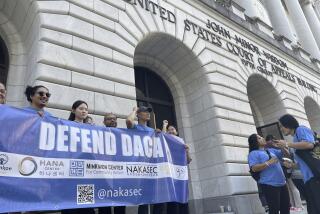Privacy advocates urge appeals court to halt NSA phone collection
- Share via
Reporting from WASHINGTON — The mass collection of U.S. telephone records by the FBI and the National Security Agency is a “sword of Damocles” hanging over Americans “every time they pick up the phone,” attorney Larry E. Klayman told the D.C. Circuit Court of Appeals on Tuesday.
Arguing to three skeptical judges for an injunction to block the government from large-scale collection of dialing records, Klayman said the program revealed by former NSA contractor Edward Snowden last year was “perhaps the biggest violation of freedom and constitutional rights in American history.”
But Justice Department lawyer H. Thomas Byron said telephone customers had “no reasonable expectation of privacy” of information about the numbers they had dialed. The data include the time and length of calls, but not the contents of conversations.
Byron argued that such call logs were business records owned by the telephone companies, not by customers, citing a 1979 Supreme Court ruling that said consumers had no privacy rights to their phone records.
“This program should be assessed on what it actually is, not what plaintiffs fear it may be in a different world,” Byron said.
At issue is a practice begun in May 2006 under the post-Sept. 11 Patriot Act. The FBI obtains logs of calls from telephone companies and feeds the “metadata” into a massive NSA database, which keeps the records for up to five years. The large majority of the records is never examined, Byron said. But if law enforcement officials want to track the calls of a suspected terrorist, they can use the database without obtaining a warrant.
The issue is before federal appeals courts in San Francisco and New York as well. Two lower-court judges have ruled in favor of the program, citing the 1979 Supreme Court decision, and one, in the District of Columbia, has ruled against it.
After nearly two hours of oral arguments Tuesday, privacy advocates did not appear to have swayed the appellate panel. All three judges are conservative Republican appointees, and from their questions they seemed reluctant to stop the collection program.
“It seems to me the implications [of an injunction] go out in many different directions,” said Judge Janice Rogers Brown. “Where would you draw the line?”
Klayman, a legal activist who has challenged the policies of presidents from both parties for years, was repeatedly challenged by Judges David B. Sentelle and Stephen F. Williams to back up his statements with facts.
“We keep asking you that and you keep evading,” Sentelle told Klayman when he asked him to justify his argument that the phone logs could help the government identify a caller’s location.
Though many reports of the program have described it as collecting records of every telephone call made in the U.S., Byron challenged such assertions, saying the government “has not acquired all or nearly all” of Americans’ dialing records.
Legislation to curtail the program passed the House in May but stalled in the Senate. In September, Senate Judiciary Committee Chairman Patrick J. Leahy (D-Vt.) called on his colleagues to vote on the legislation in November.
“The American public deserves to know where we stand on the issue of the bulk collection of innocent Americans’ phone records, and the intelligence community deserves some measure of predictability and certainty,” he said.
Twitter: @TimPhelpsLAT
More to Read
Sign up for Essential California
The most important California stories and recommendations in your inbox every morning.
You may occasionally receive promotional content from the Los Angeles Times.










